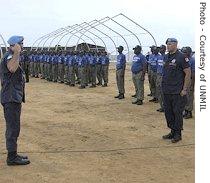2007年VOA标准英语-Liberians Fight Police Brutality(在线收听)
Dakar
28 May 2007
Some Liberians say police brutality is on the rise, and it is setting the country back in its path to reconstruction. The government is investigating the allegations, but says whether or not there have been abuses, they have been working hard to improve the security sector since the end of the civil war. Naomi Schwarz has more on the story from our regional bureau in Dakar, with additional reporting by Prince Collins in Liberia.

UNMIL's civilian police train Liberian National Police cadets (File)
Donzo Kamara is a commercial driver in Liberia's capital, Monrovia. He says he likes his job, but lately he has been frustrated by demands for bribes from national police force.
"You have police on the street collecting money from taxi drivers, which is not necessary. It is good to issue them a ticket and let them pay for their wrong," said Kamara.
Abraham Diggs, a Liberian businessman who is petitioning the government to take action, says bribes are just the beginning. He says police tactics are brutal and excessive, reminiscent of the days of Liberia's former dictator and militia leader, Charles Taylor.
"It has been alarming, because citizens continue to be afraid," said Diggs. "In fact some of them are recounting the days of Mr. Taylor because those were some of the attributes of Mr. Taylor, those are some of the things that made so many people flee from this country and we hope they will not be a replica of Mr. Taylor's regime."
According to a recent report in a Liberian newspaper, five uniformed officers and one plain-clothed policeman beat a taxidriver while trying to arrest him for wearing inappropriate shoes. The newspaper said police then threatened to arrest journalists on the scene.
Not all Liberians are convinced there is a problem. "Your term of brutality in the western sense would not really fit us here," said James Makor, the director of the Save My Future human rights organization.
Makor says there is a lot of crime in Liberia, and in order to keep the situation under control police officers do not always have the luxury of following procedures fully. He gives an example of a market in the capital that he says suffers from a lot of theft.
"People there do not feel secure with these guys. There are a lot of people that are unemployed that are snatching phones from people, and their vehicles and things like that. So if there is a crackdown on them, for me I feel happy because they would tend to disappear from the area for some time," he explained.
But Alfred Quayjandii, coordinator of the National Human Rights Center of Liberia, says the problem is the way police treat civilians in routine interactions, not their treatment of criminals during an arrest.
"We are saying that sometimes when we are dealing with a civil issue, they brutalize people, they brutalize a suspect," he said.
Mavola Weah, a student leader in Monrovia, worries the brutality could set back the whole pace of reconstruction and development.
"Investors want to come here now to make business. Now the one thing that you have is that if police brutalizes citizens, it makes investors afraid to come," said Weah.
Liberia's civil war ended in 2003. Since then, the government has worked with the United Nations and other international organizations to retrain their police force for peacetime service. Gabriel Williams, Liberia's Vice Information Minister, says the process is ongoing.
"It takes time for these people to be reconditioned in terms of their operation with respect to how they need to function in a democratic society," said Williams. "It is a challenge for all of us, but we are working to ensure that the security forces conform to the operation where the rights of people will be protected."
Williams says in the meantime, they have commissioned an independent committee to determine if police officers have crossed the line and abused innocent civilians. The government will decide if and how to address the issue based on the results of that investigation, which are scheduled to be delivered within a few weeks. Alvin Jacks, spokesman for the Liberian National Police says the investigation will exonerate the officers.